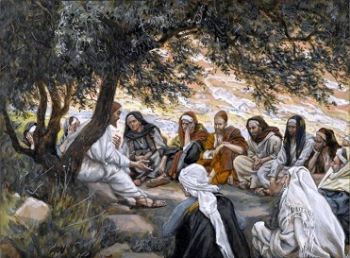The scriptures for mass today teach spiritual realities by using common everyday things that people can easily relate to. In the first reading, the prophet Hosea used a lot of images to convey God’s thoughts to His people, in terms they could understand and relate to, such as: horses, dew, lilies, cedar trees, olive trees, grain, vines, cypress trees, wine and fruit. Then, when you read the gospel today, Jesus explains the spiritual realities that his Apostles would face by using terms like: sheep, wolves, serpents and doves. A simple picture in the mind, conveys the meaning of what the prophet Hosea and Jesus were both trying to say. It is actually a very good way to teach the faith, because a picture stays in your mind a lot longer than just words alone.
Some of the best homilies our priests give tell stories for this very reason. You will remember it when you get home. There is great wisdom in this. Jesus often taught in parables for this reason too, because people would remember it if they could relate what he said, to their everyday life. We complicate things, unnecessarily sometimes.
The Catholic church has always used visual means to teach the faith, because for over 1,500 years, the average person couldn’t read. Our stained glass windows, statues, art and music actually taught the faith to people who could not read. People in ancient times did not own cameras either, so the statues and stained glass windows helped them to visualize Jesus and Mary and the saints in their mind, in order to understand them better.
We still use a lot of symbolism in the Catholic church today, for the same reasons. Oil, water, candles, incense, white baptism gowns, nativity scenes, etc. are just a few things we use in our church that visually represents spiritual realities. Even though the Eucharist is not a symbol, but the true Body of Christ, the large host the priest consecrates and elevates at the altar, is a visual reminder that we partake of the same Eucharistic bread. We are one body in Christ.
Our communion with the Lord is also a communion together, as one people. It is important to understand that when we say ‘amen’ before receiving communion, we are stating that ‘yes’ we affirm we are receiving the actual body of Christ, but it is also a ‘yes’ that we are in communion with the body of Christ and believe the same as one another. Our communion is with Christ, but also with one another, because we all share the same beliefs.
That isn’t the case in today’s gospel though. Jesus is warning his Apostles that their beliefs are different from the hostile culture they are about to enter. His advice is good for us today as well, “be shrewd as serpents and simple as doves.” Some of us are too jaded, and some of us are too naive. Neither extreme is good. It is difficult to find the right balance between the two, but that is exactly what Jesus is calling us to do.
We aren’t to trust just anyone. Jesus said to, “beware of men.” What is troubling about the gospel today is that Jesus spoke about family members turning against his disciples. Their own family, those closest to them, would turn against them. Sometimes this happens in our family too, when people do things that are wrong. Telling your children they can’t watch certain movies or listen to the wrong kind of music, or hang out with the wrong kind of friends will make them angry with you, but it’s still the right thing to do. Speaking up to a family member or a friend, about a grave sin they have committed will certainly make them upset with you as well, but is the right thing to do.
Actually, most of the time when we speak up for what is right, or good, or moral, then we usually make other people upset with us. But this is exactly what Jesus called us to do. God said the same thing in the first reading for mass when He spoke through the prophet Hosea saying, ‘for in you the orphan finds compassion.” We are to care for the least among us, and speak up if they are being mistreated or not properly cared for.
No one likes to be told they are doing something wrong. If we don’t handle our interactions with them right though, it can cause more harm than good. That is why Jesus said to, “be shrewd as serpents and simple as doves.” This is especially true in how parents relate to their children, but it is also true in how we relate to other adults too.
Pope Francis has certainly set the right example with situations of this nature. He addresses the wrong, no matter who committed it. This is a very good reflection of Jesus Christ and of the gospel reading we just had for mass today. Perhaps we should remember his example the next time we need to address a wrong as well, especially when we know it will not be well received by the person we need to speak to.
Hosea 14: 2-10 / Psalm 51 / Matthew 10: 16-23

